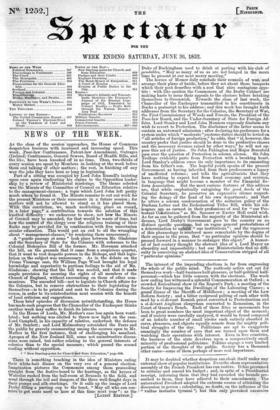There is something touching in the idea of Ministers eating
their white-bait dinner on the very eve of a general election. Imagination pictures the Commoners among them proceeding straight from the festive board to the hustings, as the heroes of Waterloo rushed from the ball-room at Brussels to the field, and went through the toil and dangers of the three well-fought days in their pumps and silk-stockings. Or it calls up the image of Lord Derby filling a parting cup to the toast, " May all who can con- trive to get seats meet us here at this time next year " ; as the Duke of Buckingham used to drink at parting with his club of pendables, "May as many of us as are not hanged in the mean time be present at our next merry meeting."
The heroes of Homer duly conclude their councils of war, and arrange their plans of battle, before they set about those banquets which their poet describes with a zest that stirs contagious appe- tite : with like caution the Commoners of the Derby Cabinet are making haste to issue their appeals to the electors before betaking themselves to Greenwich. Towards the close of last week, the Chancellor of the Exchequer transmitted to his constituents in Bucks a postscript to his address ; and this week-has brought forth addresses from the Secretary for the Colonies, the Secretary at War, the First Commissioner of Woods and Forests, the President of the Poor-law Board, and the Under-Secretary of State for Foreign Af- fairs. Lord Stanley and Lord John Manners expressly disclaim any wish to revert to Protection. The disclaimer of the latter seems to contain an untoward admission : after declaring his preference for a system under which " moderate ",customs-duties should be levied on " all articles of foreign production," he adds, that " if, however, the country prefer that justice should be done to the prdductive classes and the necessary revenue raised by other ways," he will not op- pose this act of justice. Sir John Pnkington and Major Beresford pass over the question of Protection in solemn silence. Sir John Trollope evidently parts from Protection with a breaking heart. Lord Stanley's address owes its only importance to its emanating from his father's son. The hopeful youth speaks of the present Government as having inherited from their predecessors a legacy of uneffected reforms ; and tells the agriculturists that they have nothing to expect but from fiscal economy and revision, in language that might become a Member of the Financial Re- form Association. But the most curious features of this address are, that while emphatically eulogizing the good deeds of the Colonial Secretary, he preserves an expressive silence respect- ing the doings of the head of his own department; and that he utters a solemn condemnation of the sectarian policy of the Durham Letter and the Ecclesiastical Titles Bill, while his col- leagues are as earnest in their professions of zeal for " our Pro- testant Constitution" as Mr. Spooner or Exeter Hall could wish. As far as can be gathered from the majority of the Ministerial ad- dresses, 'Lord Derby's' GOvernment goes to the country on no distinct specific) questions, but on vague general protestations of a determination to upheld " our institutions " : and the vagueness of this phraseology is rendered more remarkable by the dogma of their organs in the press, that " no particular opinions should be pressed forward in a manner to endanger this object." A humor- * of last century thought the abstract idea of a Lord Mayor an absurdity and impossibility; but our Ministerialists find no diffi- culty in conceiving an abstract idea of Conservatism stripped of all "particular opinions."


























